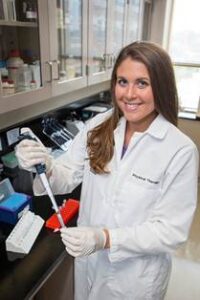June 1, 2016
The Power of SAAS: Scholarly Activity Awards for Students
By SAAS Award Recipients
The Honors Coll ege launched an initiative called Scholarly Activity Awards for Students (SAAS) a few years ago that funds approximately 12-14 awards each fiscal year. Below are some of the outcomes from the awards, which range from $125-$400 in support.
ege launched an initiative called Scholarly Activity Awards for Students (SAAS) a few years ago that funds approximately 12-14 awards each fiscal year. Below are some of the outcomes from the awards, which range from $125-$400 in support.
Kristalyn Gill: The SAAS award this semester has allowed me to reach beyond the norm of my experiences. It has supported sharing my anthropological research conducted in Peru at a conference in Vancouver. I have been blessed by the Honors College to widen my educational experience as well as enrich it deeply.
Sarah Judy: Receiving the SAAS Award has allowed me to buy the basic supplies needed to test river sediment samples contaminated with coal ash runoff for pH and respiration. Not only this, it has also allowed me to further expand my research project to include other factors initially too expensive to test.
We are currently working on characterizing if there are heavy metals present in the sediment samples and after data analysis we can see if they are present and if they themselves might be affecting microbial respiration and pH. I can then share these results with my community which has been adversely impacted by coal ash ponds in Goldsboro, NC; a community I want to advocate for and protect.
Kendal Carter: Receiving the SAAS award has opened up great opportunities for my research project. My lab is partnering with the Mayo Clinic to run a study on tissue from pig hearts that they have already harvested. This money has allowed me to perfect my lab technique and protocol for this experiment as well as contribute to the shipping of the tissue from our partner lab. I am extremely excited to continue on with this research and receiving the SAAS award has made this feasible.
Daniel Franch: A SAAS Award helped me attend the 2016 Southeastern Writing Center Association Conference (SWCA) in Columbus, GA. At SWCA, I presented with two co-workers about writer identity and how consultants can develop writer identity in the writing center. My presentation focused on using Howard Gardner’s theory of multiple intelligences to adjust consulting methods according to the diverse learning styles of the students we serve.
Carrie Beard: Receiving a SAAS Award from the Honors College has greatly impacted my undergraduate research experience. The funding helped me purchase the resources I needed to complete my experimentation and also allowed me to expand the scope of my research further than I initially planned. I am very grateful for the Honors College’s support of student research!
Emily Bolger: The money went towards purchasing equipment in Dr. Sargent’s research lab that allows us to interface with high-end computers that preform the bulk of our calculations. The equipment also allows us to preform post-processing graphical visualization of key chemical results. Thanks again to the honors college for your support!
Shivam Patel: My SAAS Award allowed me to purchase more research materials for completing my senior honors project. These include reagents, antibodies, multi-well plates, and cell culture flasks. I have been able to conduct various assays and experiments repeatedly in order to obtain viable data as a result.
Denay Hayden: Children with special needs participate in less physical activity than the typically developing child. Physical activity and participation within activities is essential for a child’s physical, emotional, and mental health. Riding a bicycle is a typical childhood milestone that many children with special needs are unable to achieve. Through a local non-profit, ENC Ambucs, funds are raised to provide AmTrykes, or specially adapted tricycles, to children with special needs in this region. Our study focused on the effects of the AmTryke on the quality of life, activities, and participation in children with special needs. The SAAS award was very beneficial for purchasing mailing materials for the assessments. Our study did show that use of an AmTryke appears to improve the quality of life, activities, and participation in children with special needs. In terms of their sense of independence and mood, children with special needs who are unable to walk alone may benefit more than others from the use of an AmTryke.
- Categories:
- Honors College
- Scholarships
